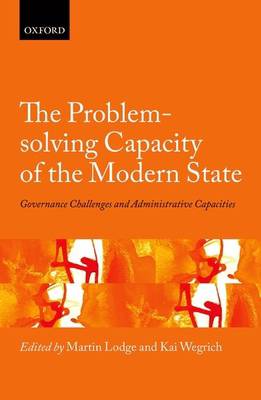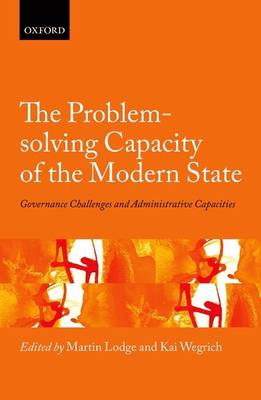
- Afhalen na 1 uur in een winkel met voorraad
- Gratis thuislevering in België vanaf € 30
- Ruim aanbod met 7 miljoen producten
- Afhalen na 1 uur in een winkel met voorraad
- Gratis thuislevering in België vanaf € 30
- Ruim aanbod met 7 miljoen producten
Zoeken
Problem-Solving Capacity of the Modern State
Governance Challenges and Administrative Capacities
Martin Lodge
€ 225,95
+ 451 punten
Omschrijving
The early 21st century has presented considerable challenges to the problem-solving capacity of the contemporary state in the industrialised world. Among the many uncertainties, anxieties and tensions, it is, however, the cumulative challenge of fiscal austerity, demographic developments, and climate change that presents the key test for contemporary states. Debates abound regarding the state's ability to address these and other problems given increasingly dispersed forms of governing and institutional vulnerabilities created by politico-administrative and economic decision-making structures. This volume advances these debates, first, by moving towards a cross-sectoral perspective that takes into account the cumulative nature of the contemporary challenge to governance focusing on the key governance areas of infrastructure, sustainability, social welfare, and social integration; second, by considering innovations that have sought to add problem-solving capacity; and third, by exploring the kind of administrative capacities (delivery, regulatory, coordination, and analytical) required to encourage and sustain innovative problem-solving. This edition introduces a framework for understanding the four administrative capacities that are central to any attempt at problem-solving and how they enable the policy instruments of the state to have their intended effect. It also features chapters that focus on the way in which these capacities have become stretched and how they have been adjusted, given the changing conditions; the way in which different states have addressed particular governance challenges, with particular attention paid to innovation at the level of policy instrument and the required administrative capacities; and, finally, types of governance capacities that lie outside the boundaries of the state.
Specificaties
Betrokkenen
- Auteur(s):
- Uitgeverij:
Inhoud
- Aantal bladzijden:
- 328
- Taal:
- Engels
- Reeks:
Eigenschappen
- Productcode (EAN):
- 9780198716365
- Verschijningsdatum:
- 30/12/2014
- Uitvoering:
- Hardcover
- Formaat:
- Genaaid
- Afmetingen:
- 155 mm x 236 mm
- Gewicht:
- 635 g

Alleen bij Standaard Boekhandel
+ 451 punten op je klantenkaart van Standaard Boekhandel
Beoordelingen
We publiceren alleen reviews die voldoen aan de voorwaarden voor reviews. Bekijk onze voorwaarden voor reviews.












